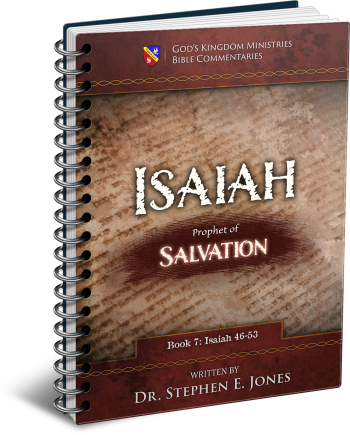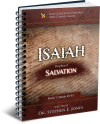Latest Posts
View the latest posts in an easy-to-read list format, with filtering options.

Isaiah is the prophet of Salvation. He is also known as the truly "Universalist" prophet, by which is meant that He makes it clear that salvation is extended equally to all nations and not just to Israel. He lived to see the fall of Israel and the deportation of the Israelites to Assyria, and he prophesied of their "return" to God (through repentance). He is truly a "major prophet" whose prophecies greatly influenced the Apostle Paul in the New Testament.
Category - Bible Commentaries

Isaiah 49:7 says,
7 Thus says the Lord, the Redeemer of Israel and its Holy One, to the despised One, to the One abhorred by the nation, to the Servant of rulers, “Kings will see and arise, princes will also bow down, because of the Lord who is faithful, the Holy One of Israel who has chosen You.”
The despised Redeemer is uniquely a theme of Isaiah. It is an ironic story of the Messiah redeeming those who then abhor and despise Him, while at the same time the nations who had remained in bondage, unredeemed, “see and arise.” Their princes “bow down, because of the Lord who is faithful” to keep His New Covenant to all mankind.
It is the story of ungrateful Israelites who are compared with thankful non-Israelites. They are thankful that God has not forgotten them in His plan of salvation. This revelation foreshadows that which we see in greater detail in Isaiah 53:3, “He was despised and forsaken of men, a man of sorrows and acquainted with grief.” Why was He so despised? Isaiah seems to attribute it to the fact that He came as “the Servant of rulers,” instead of as a king.
The people were used to obeying rulers through fear. What were they to do with a Messiah who would be born in a stable? The Messiah looks for those who will love Him, not out of compulsion, but from getting to know His heart. He chose His disciples with the same principle in mind, calling men of low estate, men who were nobodys, men who were despised by civil and religious rulers for having little education and even less money.
Isaiah 49:8, 9 says,
8 Thus says the Lord, “In a favorable time I have answered You, and in a day of salvation [Yeshua] I have helped You; and I will keep You and give You for a covenant of the people, to restore the land, to make them inherit the desolate heritages, 9 saying to those who are bound, “Go forth,” to those in darkness, “Show yourselves.” Along the roads they will feed, and their pasture will be on all bare heights.
The time that the Messiah ministered as a Servant to all was an unfavorable time, in that He was abhorred and despised by those whose hearts secretly despised God Himself. Yet there is an appointed time that is pleasing to God where the situation is reversed. The word “favorable” is from the Hebrew word ratsown, “delightful, pleasing, favorable, acceptable.” This word is used again in Isaiah 61:2, where the mission of Christ was “to proclaim the favorable year of the Lord.”
Isaiah equates this “favorable time” to the “day of Yeshua,” i.e., “salvation.” In other words, it is “the day of the Lord.” Most view this “day” in negative terms, thinking that God will destroy the nations in battle. However, Isaiah says that it is a day when God gives “You [Christ] for a covenant of the people.” It is to release “those who are bound,” or, as Isaiah 61:1 puts it, “to proclaim liberty to captives and freedom to prisoners.”
This is not about God destroying Israel’s enemies, as so many think. It is about the mission of Christ, which He Himself proclaimed in Luke 4:18, 19. There Jesus used Isaiah 61:1, 2 as His main text in the synagogue at Nazareth to show His concern for the non-Israelite people. He told them that there were many Israelite lepers in the land, but God miraculously healed Naaman the Syrian. During the famine in Elijah’s day there were many starving Israelites, but God miraculously provided for the widow of Sidon.
The city of Nazareth was populated by extreme nationalists who were greatly offended by this, and they nearly stoned Jesus to death (Luke 4:28, 29).
This shows that we ought not to interpret these verses in an ultra-nationalist manner, lest we fall into the error of the Nazarenes. We must keep in mind what was written in the previous verse (Isaiah 49:7), where we find non-Israelite kings and princes bowing to Christ, even though the Israelites had despised and abhorred Him.
Hence, the “favorable time” and “the day of Yeshua” are times of salvation for all—not the salvation of Israelites alone. Both Israelites and foreigners have walked equally in darkness as prisoners bound by sin. Jesus came to release these captives. The restoration is universal.
Isaiah 49:10 says,
10 “They will not hunger or thirst, nor will the scorching heat or sun strike them down; for He who has compassion on them will lead them and will guide them to springs of water.”
Isaiah’s metaphoric language paints a picture of people who hunger and thirst for righteousness, implying the answer that Jesus gave in Matt. 5:6, “they shall be satisfied.” Those who were lost in the wilderness might soon faint under “the scorching heat or sun,” but Jesus, by the Holy Spirit, “has compassion on them and will lead them and guide them to springs of water.” These are springs of living water (Isaiah 12:2, 3) from which, when one drinks, he will never thirst again (John 4:13, 14).
This describes “the day of Yeshua,” as we see in the New Testament, where Jesus actually fulfilled the things that Isaiah prophesied in metaphoric language.
Isaiah 49:11, 12 says,
11 “I will make all My mountains a road, and My highways will be raised up. 12 Behold, these will come from afar; and lo, these will come from the north and from the west, and these [elle, “these, those, others”] from the land of Sinim [i.e., China].”
It is common today to apply this to Jews returning to the old land. However, the prophet did not suddenly switch from metaphoric to literal language. The “highways” that the prophet had in mind were described in Isaiah 35:8-10,
8 A highway will be there, a roadway, and it will be called the Highway of Holiness. The unclean will not travel on it, but it will be for him who walks that way, and fools will not wander on it. 9 No lion will be there, nor will any vicious beast go up on it; these will not be found there, but the redeemed will walk there, 10 and the ransomed of the Lord will return…
This is not a literal highway, such as the “Belt and Road Initiative” being built by China today. While this new highway may serve as a type and shadow of God’s greater Highway of Holiness, these are not the same thing. China’s project appears to be a prophetic sign of world revival, where the Holy Spirit is poured out worldwide, allowing many to find Christ, who is the way back to God.
On God’s highway, only “the redeemed will walk there.” Lions and fools will not find that Highway of Holiness, for it is the way to God. Jesus Himself is “the way” as well as “the truth and the life” (John 14:6). In other words, the only way to find God is to follow Jesus, “the way.”
Sinim is a Hebrew word that literally means “thorns.” It is what they called a distant oriental country that they had heard about from contact with India. The Indians called their northern neighbors by the Sanscrit word Cina, which was anciently derived from the Qin dynasty (221 B.C.). Even before then, in the fifth century B.C., Persian (Iranian) literature referred to China by the name Cinastan (Cina, “China,” and stan, “where people live.”
The word Sino is derived from the Latin word Sinae, which was their name for China. Hence, historians refer to the war between China and Japan (1930’s) as the Sino-Japanese War. The word Sinae is from the Latin root, Seres, which was borrowed directly from Greek. Seres probably means “silk.” The Romans used the term Sericum to mean “Chinese goods,” i.e., silk.
While some interpret Isaiah 49:11, 12 in terms of their Zionist viewpoint, where Jews from China would immigrate to the old land, I see this as prophesying great numbers of Chinese people finding Christ “the way” and thereby returning to God.
Foreseeing this great return to God, the prophet breaks forth, saying in Isaiah 49:13,
13 Shout for joy, O heavens! And rejoice, O earth! Break forth into joyful shouting, O mountains! For the Lord has comforted His people and will have compassion on His afflicted.
When the two great witnesses, heaven and earth, come into agreement, the restoration of all things is complete. This is the opposite of heaven and earth bearing witness of corruption and sin, which leads to destruction, death, and exile (Deut. 4:25, 26). When the New Covenant was established, the path to righteousness by the Highway of Holiness was established. The prophet rejoiced to see that day.
Isaiah also included the “mountains,” which was a Hebrew metaphor for nations. Hence the nations of the earth will “break forth into joyful shouting.” David foresaw the same thing when he wrote in Psalm 67:4,
4 Let the nations be glad and sing for joy; for You will judge the peoples with uprightness and guide the nations on the earth. Selah.
Divine judgment is thus seen, not as a terrifying situation, but as a time of gladness and relief from the pain and oppression of the rule of selfish men and their man-made laws. Paul says that all of creation looks forward to the manifestation of the sons of God (Rom. 8:19-21).
The promise of “comfort” in Isaiah 40:1 thus finds its climax in Isaiah 49:13, when “the Lord has comforted His people.” In other words, when God sends forth the Holy Spirit, all who are thus drawn to Christ are said to be “comforted.” It is another way of telling us that they have been “filled with the Spirit.”